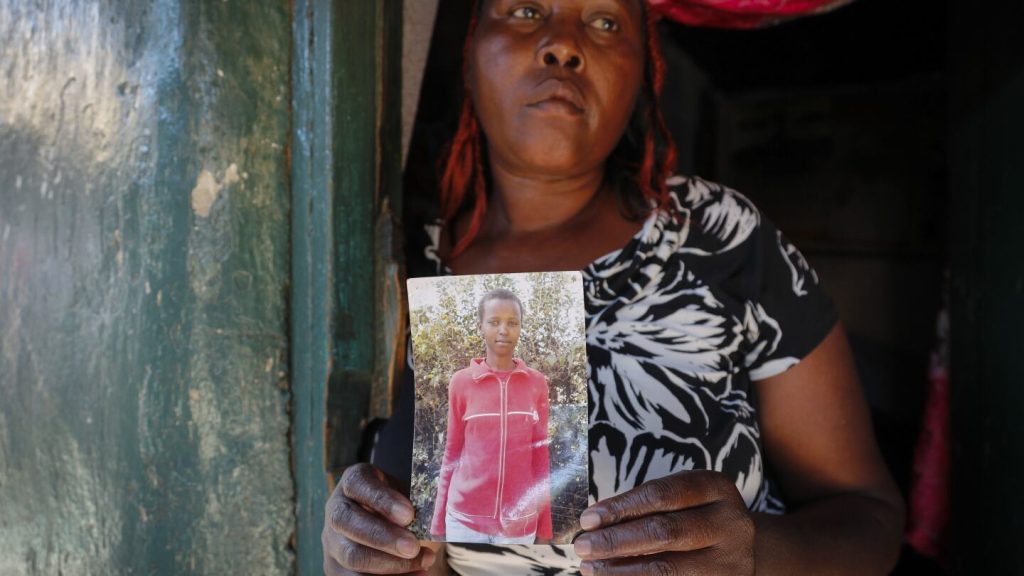Listen to the article
Former British soldier Robert James Purkiss appeared in Westminster Magistrates’ Court on Friday to fight extradition to Kenya, where he faces murder charges in connection with the death of a woman whose decomposed body was discovered in a septic tank 13 years ago.
The 38-year-old is charged with killing Agnes Wanjiru, a 21-year-old Kenyan woman who was last seen leaving a hotel bar with British soldiers in the town of Nanyuki, located near a British army training facility. Purkiss “vehemently denies” the murder charge, according to his defense lawyer David Josse.
Prosecutor Joel Smith told the court that British soldiers on leave had been drinking heavily on March 31, 2012, at a hotel where they were known to pay local women for sex. Wanjiru had left her baby daughter with a friend that night, saying she was going to “hustle for her daughter.” It was the last time she was seen alive.
Smith detailed how Purkiss allegedly confessed to fellow soldiers after the incident. One soldier who had been drinking that night reported seeing Purkiss crying. When asked why, Purkiss reportedly said, “I’ve killed her.” The prosecutor also stated that Purkiss told another colleague that it was “sex that went wrong” and subsequently led a soldier to the septic tank to view the body.
Throughout the prosecutor’s presentation of evidence, Purkiss shook his head in apparent disagreement. A postmortem examination suggested that Wanjiru may have still been alive when she was placed in the septic tank, according to Smith.
The case has significant diplomatic implications for British-Kenyan relations, particularly regarding the conduct of British military personnel stationed or training in Kenya. The British Army has maintained a permanent training facility in Nanyuki since the early 1960s, following Kenya’s independence from Britain. Thousands of British soldiers rotate through the base annually for jungle warfare training and other exercises.
Wanjiru’s family has been seeking justice for over a decade. Their representative recently met with British Defense Secretary John Healey, who pledged his support for their cause. This meeting came after a Nairobi court in September ordered the arrest of Purkiss, who was not publicly named at that time.
The case has highlighted concerns about the behavior of foreign military personnel in local communities and the challenges of cross-border justice when crimes allegedly involve soldiers stationed abroad. It also raises questions about the accountability of military personnel for actions committed while off-duty in foreign countries.
Human rights organizations in Kenya have long documented issues involving foreign military presence, with some alleging that cases involving local victims sometimes receive inadequate attention from authorities. The Wanjiru case has become emblematic of these broader concerns in Kenya.
District Judge Briony Clarke denied a request to release Purkiss on bail. He remains in custody until a scheduled bail hearing on November 14. If extradited, Purkiss would face trial in Kenya, where the murder allegedly took place.
Purkiss currently lives with his wife and two children in Britain, where he is self-employed and works from home, according to his defense attorney.
The case continues to draw attention to the sometimes fraught relationship between foreign military forces and local populations, as well as the complexities of international legal cooperation in criminal matters spanning multiple jurisdictions.
Fact Checker
Verify the accuracy of this article using The Disinformation Commission analysis and real-time sources.




12 Comments
This is a complex and sensitive case that deserves careful consideration. The British government must work closely with Kenyan authorities to ensure a fair and transparent process, regardless of the defendant’s former military status.
Well said. Cooperation and adherence to the rule of law should be the top priorities in resolving this matter.
This case raises important questions about the accountability of military personnel and the treatment of local women in areas where foreign troops are stationed. Transparency and justice are crucial in these types of incidents.
You make a good point. The military must ensure proper oversight and discipline to prevent such tragedies from happening.
This is a tragic and troubling case. If the allegations are true, it’s concerning that a former British soldier may have committed such a heinous crime and evaded justice for so long. However, the defendant maintains his innocence, so we’ll have to see how the extradition proceedings unfold.
I agree, the details are quite disturbing. Hopefully the truth will come to light through a fair and thorough legal process.
It’s troubling to hear that a British soldier may have been involved in the death of a Kenyan woman. While the details are still emerging, the allegations suggest a concerning pattern of abuse and cover-up. Thorough investigation and justice are paramount.
I agree, this case highlights the need for stronger protections and accountability mechanisms for local populations in areas with foreign military presence.
The allegations against Purkiss are deeply disturbing. If true, it’s a tragic example of the abuse of power and the vulnerability of local women in areas with a heavy military presence. Impartial justice must be served.
I agree completely. Impunity for such crimes cannot be tolerated, no matter the perpetrator’s background.
The death of Agnes Wanjiru is deeply saddening. British soldiers should be held to the highest standards of conduct, both at home and abroad. If the allegations against Purkiss are proven, he must face the consequences of his actions.
Absolutely. No one should be above the law, regardless of their position or background.